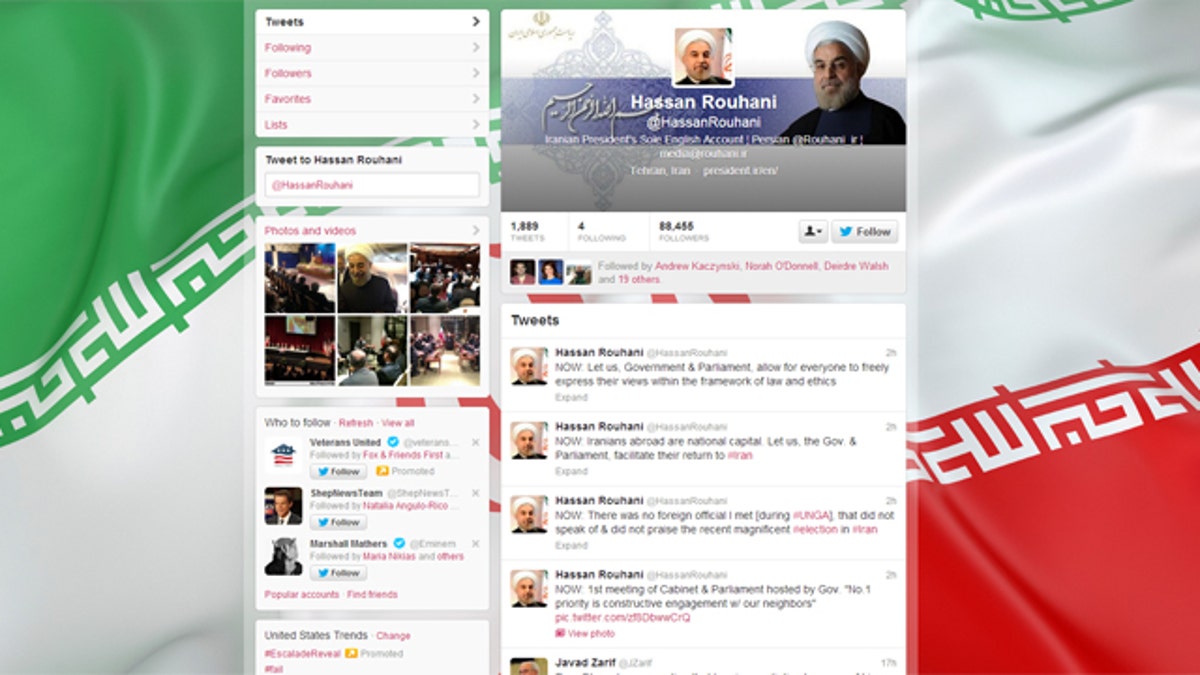
Oct. 1, 2013: The Twitter feed of Iranian President Hassan Rouhani. (Twitter)
#HassanRouhani Good evening, President. Are citizens of Iran able to read your tweets?
It’s a simple question that Twitter creator Jack Dorsey put out from his personal account today, drawing a response from Rouhani's account.
Dorsey was referring to Rouhani and other members of the Iranian regime relying heavily these days on the Twitter social media platform as a way to communicate with the public. Rouhani responded by claiming he is working on ensuring his people will "comfortably b able 2 access all info globally as is their #right."
Back at home, however, it’s a different story.
The Iranian regime has censored the Internet, slowing or even stopping connection and blocking popular sites such as Google, Facebook, Twitter and YouTube as a way to deter Iranians from organizing political movements, uniting and exchanging ideas. The Iranian people have learned to bypass the censorship using anti-filter programs and software, which are proxies that use third-party servers to get them to these forbidden sites.
“It’s as if a father sits at home all day watching satellite television (which is forbidden in Iran) and then doesn’t let his child watch, telling him it’s bad for him,” said Reza, a 35-year-old satire writer from Tehran. “It’s a joke how the government here is so two-faced.”
Rouhani first told the world about his historic phone call with President Obama Friday through Twitter.
Rouhani tweeted that he told Obama "Have a Nice Day!" and Obama responded with "Thank you. Khodahafez (goodbye)."
The two men "expressed their mutual political will to rapidly solve the nuclear issue," the tweet said.
Today, Iran’s new Foreign Minister Mohammad Javad Zarif used Twitter to communicate a very strong message of a different kind to President Obama:
“Pres. Obama's presumption that Iran is negotiating because of his illegal threats and sanctions is disrespectful of a nation, macho and wrong,” Zarif tweeted.
“President Obama needs consistency to promote mutual confidence. Flip flop destroys trust and undermines U.S. credibility,” he wrote in a second tweet.
This came as a shift in tone from the Iranian regime, that has fully been engaged in a charm offensive toward the U.S. in recent weeks, which led up to a historic phone call between the leaders of the two countries upon Rouhani’s exit from New York City.
While no commitments have been made to cut off the Internet entirely, threats have been made since early 2011, when Iran unveiled plans for a “halal network,” or an “Islamically permissible” intranet that would disconnect the nation from the rest of the world.
At the time of the announcement, Iranian authorities said the new infrastructure would be revealed soon, but did not give a specific time frame.
Iran’s network could mirror what Burma, another nation with Draconian cyber crackdowns, has done to isolate its people from the Web, limiting users to a national intranet at a high price that deters most potential users.
In December, ironically, the man who forbid an entire country from visiting social-networking sites and even sentenced violators to death, Iran's highest dictator and Supreme Leader Ayatollah Ali Khamenei started his own Facebook fan page, which ignited quite a stir in the media world.
Since the anti-regime protests of 2009, dubbed the "Twitter Revolution," the Iranian people have had an overwhelming presence on social media sites and blogs.
Last year, the regime allegedly tortured to death 35-year-old blogger Sattar Beheshti, who was targeted for continually publicizing social and political issues that were considered unflattering to the regime on his personal blog and on Facebook.
While Beheshti was a small threat to the regime, his torture and subsequent death may likely have been a preemptive warning to the millions of young Iranians who have taken their anti-government disenchantments to the blogosphere.
Since the 2009 uprisings, roughly $76 million of the total $11.5 billion allocated to the Islamic Revolution Guards Corps has been spent on cyberwarfare. Iran’s cyberpolice monitor the Internet, various websites, blogs and individuals suspected of using circumvention tools designed to evade the censors.
